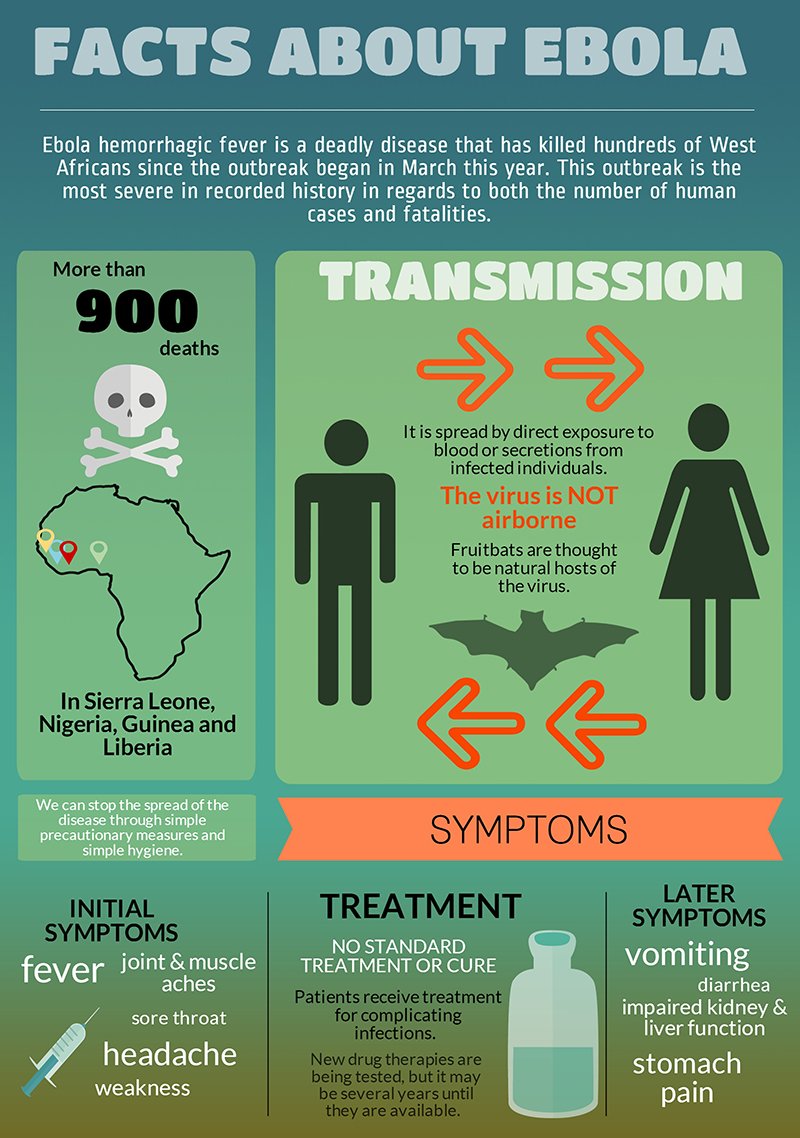
Ebola Fast Facts
Ebola hemorrhagic fever is a disease caused by one of five different Ebola viruses. Four of the strains can cause severe illness in humans and animals. The fifth, Reston virus, has caused illness in some animals, but not in humans. The first human outbreaks occurred in 1976, one in northern Zaire (now Democratic Republic of the Congo) in central Africa: and the other, in southern Sudan (now South Sudan). The virus is named after the Ebola River, where the virus was first recognized in 1976, according to the Centers for Disease Control and Prevention (CDC). Ebola is extremely infectious but not extremely contagious. It is infectious, because an infinitesimally small amount can cause illness. Laboratory experiments on nonhuman primates suggest that even a single virus may be enough to trigger a fatal infection. Ebola is considered moderately contagious because the virus is not transmitted through the air. Humans can be infected by other humans if they come in contact with body fluids from an infected person or contaminated objects from infected persons. Humans can also be exposed to the virus, for example, by butchering infected animals. Symptoms of Ebola typically include: weakness, fever, aches, diarrhea, vomiting and stomach pain. Additional experiences include rash, red eyes, chest pain, throat soreness, difficulty breathing or swallowing and bleeding (including internal). Typically, symptoms appear eight to 10 days after exposure to the virus, but the incubation period can span two to 21 days. Ebola is not transmissible if someone is asymptomatic and usually not after someone has recovered from it. However, the virus has been found in the semen of men who have recovered from Ebola and possibly could be transmitted from contact with that semen. There are five subspecies of the Ebola virus: Zaire ebolavirus (EBOV), Bundibugyo ebolavirus (BDBV), Sudan ebolavirus (SUDV), Taï Forest ebolavirus (TAFV) and Reston ebolavirus (RESTV).

Online searches for gambling addiction surge as legalized sports betting expands, study finds
Internet searches seeking help for gambling addiction have "increased substantially" as the number of states with legalized sports betting has expanded in recent years, prompting a need for more public health awareness, according to a study released Monday. The findings "suggest that sportsbooks pose a substantial health concern," researchers at the University of California, San Diego, and Bryn Mawr College wrote in the journal JAMA Internal Medicine. "A paradigm shift in how regulatory frameworks and health organizations collaborate to address the complexities of gambling harms is needed," the researchers wrote. The study comes as legalized sports betting has exploded into a multibillion-dollar industry following a 2018 Supreme Court ruling that broke up Nevada's monopoly on the practice and cleared the way for state-sponsored sports gambling.

US Navy veteran beats cancer with experimental treatment and reliance on faith
After facing the threat of active war, many veterans also wage battles with cancer. One of those is John Ryan of Aldie, Virginia – a U.S. Navy veteran who was diagnosed with lung cancer after serving in the military for 30 years. Since he enlisted in October 1962, much of the commander’s military service has been "shrouded in secrecy," according to a November 2024 report from the Cancer Research Institute (CRI).

Bird flu vaccine gets ‘conditional license’ from USDA, company announces
A New Jersey pharmaceutical company has received a "conditional license" for its bird flu vaccine for use in chickens. The vaccine, developed by Zoetis, targets the H5N2 subtype of avian influenza, which has been found in both poultry and humans, according to a press release from the company. The license was granted by the U.S. Department of Agriculture (USDA), Center for Veterinary Biologics (CVB), the same source stated.

Flu cases are highest in these US states: See the map
The U.S. is in peak flu season, as the Centers for Disease Control (CDC) says "seasonal influenza activity remains elevated and continues to increase across the country." Case counts vary by state, however. Each week, the CDC releases a map of influenza activity across the country. The color-coded map indicates each state’s activity level, ranging from minimal to very high. The most current map reflects data from the week ending Feb 8, 2025.

New Netflix series highlights the gaps in the modern medical system
The show is a dramatization of the story of Belle Gibson, a convicted Australian scammer who claimed she had terminal brain cancer who is played by Kaitlyn Dever, and the impact she had by selling books and an app that claimed clean eating made her well again. Also featured is a fictionalized representation of one of the people Gibson impacted named Lucy. In the show, her character stops her cancer treatments in hopes that Gibson’s method will cure her in a more compassionate way than the hospital system. Show creator Samantha Strauss said the character of Lucy was important to depict what a lot of people feel when fighting a disease: not listened to, not in control and not acknowledged as a full person. “So, it makes sense we want to put our faith in the hands of someone (likely beautiful) on the internet,” Straus said in an email. “We know they’re selling us something, but when you’re terrified that you’re sick and dying, or that someone you love is sick and dying, you can’t put a price on hope.” The problems depicted in the show are not just a work of fiction. There is a real need for more widespread preventative and lifestyle treatment in the US medical system, said Dr. Dariush Mozaffarian, a cardiologist and director of the Food is Medicine Institute at Tufts University in Massachusetts. “There are many patients who are suffering from auto immune diseases, chronic pain diseases, other chronic diseases where their regular medical system has failed them,” he said. “It’s basically just doing kind of Band-Aid fixes to get them past their symptoms.”

Wyoming woman hospitalized with bird flu
An older woman in southeast Wyoming is hospitalized with bird flu, state health department officials said Friday. It’s the state’s first human case of Type A H5N1 influenza, which is spreading through animals and some people. Nearly 70 people in the U.S. have been reported infected with bird flu in the last year, according to data from the U.S. Centers for Disease Control and Prevention, though researchers and studies suggest that’s likely an undercount.

Obesity wouldn't be solely defined by BMI under global experts' new plan
A group of global experts is proposing a new way to define and diagnose obesity, reducing the emphasis on the controversial body mass index and hoping to better identify people who need treatment for the disease caused by excess body fat. Under recommendations released Tuesday night, obesity would no longer be defined solely by BMI, a calculation of height and weight, but combined with other measurements, such as waist circumference, plus evidence of health problems tied to extra pounds. Obesity is estimated to affect more than 1 billion people worldwide. In the U.S., about 40% of adults have obesity, according to the U.S. Centers for Disease Control and Prevention.

American doctor cancer survivor runs 7 marathons on 7 continents in 7 days
A Wisconsin doctor achieved a once-in-a-lifetime feat this month when he participated in seven marathons on seven different continents – seven days in a row, he told Fox News Digital. Dr. T. Clark Gamblin, a surgeon at Froedtert and the Medical College of Wisconsin, is a testicular cancer survivor who ran in the World Marathon Challenge from Jan. 31 to Feb. 6. Gamblin represented the Testicular Cancer Awareness Foundation, an organization dedicated to raising awareness about the most pervasive cancer impacting young men.

An intense flu season is filling hospitals with severely ill patients
The US is in the throes of an unusually intense and severe flu season, with hospitalization rates topping the levels seen with Covid-19 at some points of the pandemic. On top of the flu infection itself, doctors say they’re seeing large numbers of patients with some of its most devastating complications. In children, specialists say they’re seeing more than usual come to the hospital with neurologic complications, including devastating brain swelling that leads to tissue death — a condition called acute necrotizing encephalopathy, or ANE.
